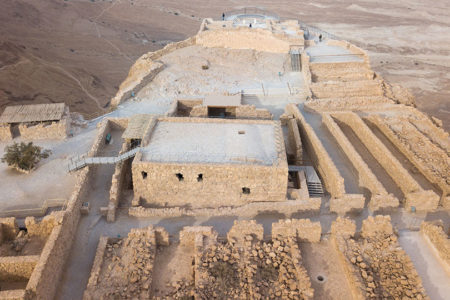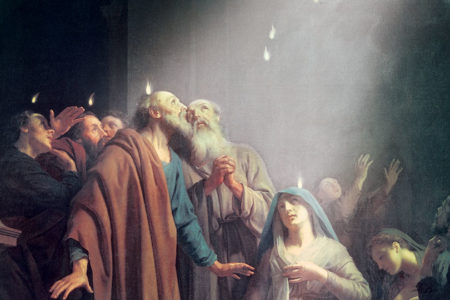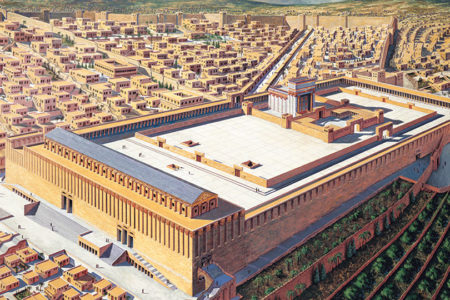Building on the ‘ROCK’
In 1866 Samuel J. Stone penned the words to the great hymn of the faith “The Church’s One Foundation.” The opening words make a powerful statement about the church and its mission: “The church’s one foundation is Jesus Christ her Lord.” Rev. Stone understood clearly that the church is founded on Jesus Christ. It exists by Him and for Him.
And its mission is to proclaim Him by preaching God’s Word and living in a way that will draw unbelievers to Him. Doing so requires understanding of who Jesus is and what He requires of us.
When Jesus was in Caesarea Philippi, He asked His disciples, “Who do men say that I, the Son of Man, am?” (Mt. 16:13).
Simon Peter answered, “You are the Christ, the Son of the living God” (v. 16). And Jesus replied,
Blessed are you, Simon Bar-Jonah, for flesh and blood has not revealed this to you, but My Father who is in heaven. And I also say to you that you are Peter, and on this rock [Peter’s confession that Jesus is Messiah] I will build My church, and the gates of Hades shall not prevail against it (vv. 17–18).
The Greek word used here for “church” literally means “called-out ones.” The Lord was going to call out a people to be part of a special group that He would put together.
And just prior to His ascension to heaven, Jesus Himself declared this group’s mission: “Go therefore and make disciples of all the nations, baptizing them in the name of the Father and of the Son and of the Holy Spirit, teaching them to observe all things that I have commanded you” (28:19–20). “Go into all the world and preach the gospel to every creature” (Mk. 16:15). “You shall be witnesses to Me in Jerusalem, and in all Judea and Samaria, and to the end of the earth” (Acts 1:8).
The Lord clearly gave the fledgling church its purpose statement. It was to go and to make disciples everywhere, both locally (in Jerusalem) and to the uttermost.
Go and Preach
The church is not a building. It is a collection of individuals redeemed from every nation, tongue, tribe, and ethnic origin who have been saved by God’s grace through faith. Its main objective is to make the Messiah (Christ) known to people everywhere. The Lord commissions all believers in Him to declare Him to the entire world.
The apostle Paul instructed his protégé Timothy, “Preach the word! Be ready in season and out of season. Convince, rebuke, exhort, with all longsuffering and teaching” (2 Tim. 4:2). Timothy was to declare the gospel message even if his audience did not want to hear it.
The gospel is rarely popular. It is not usually sought after; and it is often viewed as divisive, harsh, old-fashioned, cruel, and extremely intolerant and inflexible by those who are lost and do not understand it.
But, actually, it is rooted and based in love. It is life transforming, direction altering, and offered freely to everyone without respect of rank or social status. The church’s ministry of evangelism should be freely available to anyone anywhere at any time. The message of the cross is the great equalizer, placing a peasant and a wealthy aristocrat in the same lost position and offering them the same salvation through faith in Jesus Christ.
Paul passionately shared the Lord’s heart regarding the gospel and evangelism with the church at Rome, namely: (1) our need, (2) Messiah’s work on our behalf, (3) the necessity to believe, and (4) the necessity to share what Christ has done for us:
For all have sinned and fall short of the glory of God. But God demonstrates His own love toward us, in that while we were still sinners, Christ died for us. For “whoever calls on the name of the Lᴏʀᴅ shall be saved” (Rom. 3:23; 5:8; 10:13).
Unsaved people cannot call on the Lord unless someone shares the Lord with them. So the church is required to go out and preach the Word:
How then shall they call on Him in whom they have not believed? And how shall they believe in Him of whom they have not heard? And how shall they hear without a preacher? And how shall they preach unless they are sent? (10:14–15). The apostle Paul’s heart beat for evangelism. His greatest desire was to see people saved. Consequently, he wrote that he wanted to “provoke to jealousy those who are my flesh and save some of them” (11:14).
We are to have the same zeal as he did to see people saved. In other words, Paul was willing to do whatever it took to get the job done. The lost should see the Lord in us and want what we have. Consequently, there must be a visible, noticeable difference between the church and the world.
Live Holy
If the church is going to “provoke,” or arouse, within lost humanity a yearning to understand and obtain salvation, believers must be holy, which literally means “unique, different” and “separate” from the surrounding world.
Peter addressed this issue in his first epistle: “He who called you is holy, you also be holy in all your conduct, because it is written ‘Be holy, for I am holy’” (1 Pet. 1:15–16). The Bible is adamant that the Lord is holy. As Christians, we sing about God’s holiness and we talk about His holiness, but we don’t actually appear to live as though we believe He is holy.
Holiness implies separation. In Hebrew, the word for “holy” can also be translated “sanctify” or “sanctification,” which implies separation. Paul likened this separation to serving in the military:
You therefore must endure hardship as a good soldier of Jesus Christ. No one engaged in warfare entangles himself with the affairs of this life, that he may please him who enlisted him as a soldier (2 Tim. 2:3–4).
Holiness unto God requires separation from the world and all it holds dear. Believers are commanded, “Do not love the world or the things in the world” (1 Jn. 2:15). We are also admonished not to be pressed into the world’s mold or image. If we are going to be lights in a sin-darkened world, we must maintain a healthy distance from Satan’s domain.
Heed Doctrine
The church also needs to “take heed…to the doctrine” (1 Tim. 4:16). Biblical doctrine addresses the church’s belief system as found in Scripture. Bible doctrine enables the followers of Jesus to understand His plan and revelation for our lives, as well as the future events of prophecy.
Down through its history, the church has battled schisms, heresies, false teachers, and false doctrine. It is imperative that the followers of the Lord Jesus understand the Bible, “rightly dividing the word of truth” (2 Tim. 2:15). Believers must not flounder in their faith, “tossed to and fro and carried about with every wind of doctrine” (Eph. 4:14). The followers of Christ are to understand the Word, have doctrinal integrity, and “stand against the wiles of the devil” (6:11).
Let the Spirit Be Your Guide
Many believe their consciences are sufficient to guide them righteously through life. On the surface, the idea sounds feasible. But in reality, the concept is flawed.
When Adam and Eve sinned, their consciences became warped and sinful. Consequently, many people sear their consciences by perverting the truth and rejecting God.
The Scriptures command followers of Jesus to walk in the Spirit (Rom. 8:1). The Holy Spirit is to be our guide and teacher: “But…the Holy Spirit, whom the Father will send in My name, He will teach you all things, and bring to your remembrance all things that I said to you” (Jn. 14:26).
The Holy Spirit in a believer’s life should produce fruit, according to Galatians 5:22–23. The fruit of the Spirit (love, joy, peace, longsuffering, gentleness, goodness, faith, meekness, temperance) is a single, solitary item. The Bible does not designate “fruits” of the Spirit but “fruit,” a single entity that believers are to evidence in and through their lives. Believers are to be under the influence of the Spirit at all times, walking in the Spirit rather than in the flesh.
Appreciate the Victory
In the lyrics to his great hymn of the faith, Samuel Stone saw the church’s struggle down through the ages. He saw Satan’s attacks, the heresies that have invaded the Body of Christ, and the constant warfare the church has endured. But the church will prevail, just as Messiah Jesus promised:
’Mid toil and tribulation, And tumult of her war,
She waits the consummation of peace forevermore;
Till, with the vision glorious, Her longing eyes are blest,
And the great church victorious Shall be the church at rest.
What a day of blessing it shall be for the bride of Christ when the Bridegroom comes for His beloved bride, the church, and takes her to the home He has prepared for her.
Meanwhile, we are to live holy lives on Earth, produce the fruit of the Spirit, and preach the Word so that others will come to know the great God whom we serve.







